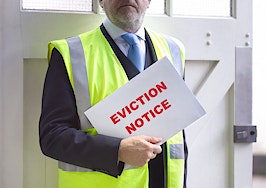In the wake of the Trump administration’s federal moratorium on evictions that was announced at the beginning of September, landlords, apartment owners and housing industry groups alike have issued legal challenges against the order, leaving millions of renters in a precarious position.
As the deadly coronavirus pandemic continues, various lawyers and lobbyists have slammed local, state and federal courts with lawsuits seeking to stop renters from invoking the ban and even eliminate the policy altogether by arguing the government did not have the authority to issue the ban from the get-go, according to the Washington Post.
One Virginia landlord filed a lawsuit arguing the Trump administration halted evictions based on a “flimsy premise” that the lack of evictions could prevent displaced renters from getting the virus. The suit is supported by an anti-regulatory conservative group with documented past financial ties to a foundation backed by Republican megadonor Charles Koch. In addition, the suit has garnered legal assistance from a major lobbying organization that’s representing apartment owners.
“There’s a reason eviction is a remedy in the law,” Caleb Kruckenberg, a lawyer at the Koch-funded New Civil Liberties Alliance, told the Post.
The wave of lawsuits puts renters on uncertain footing, making them even more vulnerable to housing insecurity. Federal officials attempted to clarify some of the policy’s ambiguity with further guidance issued on Friday evening, but the update has actually given landlords more leeway in starting eviction proceedings against cash-poor renters now, despite the moratorium’s effectiveness through the end of 2020.
Tenant advocates like Diane Yentel, president of the National Low Income Housing Coalition, believe the ability to start evictions proceedings will be used as an intimidation tactic against renters.
“To understand, ask yourself the question: Why would a landlord want to start eviction proceedings in October for an eviction that can’t happen until January? The answer: to pressure, scare and intimidate renters into leaving sooner,” Yentel told the Post.
Economists and other housing market experts have previously postured that a large wave of evictions is unlikely because landlords may have little to gain by getting rid of tenants — with so many renters in uncertain financial situations in the wake of the pandemic, it’s unclear whether landlords would be able to fill tenant vacancies with reliably paying tenants.
Many renters are in high-contact jobs, which have been more insecure throughout the pandemic. And, roughly 1 in 3 adults said it’s somewhat or very likely they could face eviction or foreclosure over the next two months, according to data recently released by the U.S. Census Bureau.
Although the U.S. Centers for Disease Control and Prevention (CDC) made an important step in issuing the moratorium, the order fell short in terms of offering full support. The order did not provide any additional funds for struggling renters or landlords, and guaranteed that property managers would be allowed to assess fees and other penalties on those who fell behind on rent payments. However, landlords are not allowed to collect past-due amounts, leaving both parties lacking in funds.
By the time the eviction moratorium expires at the end of 2020, about 34 million renting Americans stand to owe as much as $34 billion to landlords.
“People are going to be buried under a mountain of debt,” Tara Raghuveer, director of KC Tenants, a low-income tenants advocacy group based in Kansas City, Missouri, told the Post.
The National Apartment Association, an organization that represents the owners of more than 10 million rental units, joined a lawsuit filed by a Virginia landlord in a U.S. district court in Georgia where the CDC is based.
KBW Investment Properties, a real estate holding company based in Columbus, Ohio, sued the CDC in September for infringing upon the company’s constitutional rights to filing evictions. The company’s complaint also asked the judge to invalidate the eviction moratorium completely.
Although the legal battle ensued for weeks, KBW Investment Properties agreed to drop the case on Friday after the Justice Department indicated that it would not prevent landlords from starting evictions proceedings prior to the end of the ban on evictions.
Then, late Friday, as a result of the dropped lawsuit, the CDC and Justice Department issued their clarification that landlords anywhere in the U.S. could start the eviction process while the moratorium is active and are under no obligation to “make their tenants aware” that the eviction ban is currently active.
A lack of uniformity in the enforcement of the ban has led to widespread confusion about exactly what protections tenants have and what actions landlords can still take. Depending on the judge overseeing the case, some tenants have still faced evictions, encouraged further by the Trump administration’s leeway in allowing landlords to evict renters for reasons unrelated to financial hardship as a result of the pandemic, like other minor lease violations.
“The CDC moratorium has some holes in it,” Peggy Bailey, vice president for housing policy at the Center on Budget and Policy Priorities, said. “Landlords can still move for an eviction if they come up with a reason other than loss of income due to the pandemic, and it’s on the resident to prove the landlord wrong.”
In a move towards unity, renters and landlords have called on Congress to act by allocating billions of dollars to help renters catch up on their past-due bills, which would in turn give landlords a financial boost. Although the plan has been put forward by House Democrats in a $3 trillion coronavirus stimulus package, many Republicans, as well as President Trump, have opposed the bill while failing to agree on the size and scope of a second stimulus package.
In mid-September, trade associations, including representatives from the National Association of Realtors (NAR), met with White House aides to discuss concerns with the CDC moratorium and the difficulties it has caused landlords, according to a member of NAR who was present at the meeting. The NAR member said other members present at the meeting expressed the difficulties the order presented landlords in terms of of paying mortgages and other bills, but also the weighty implications the order had on residents and future financial burdens they might incur as a result of unpaid rent.
At the meeting, NAR also urged the need for rental assistance to help landlords and tenants, and at that time, the White House said it would support aid either in a future stimulus package or by potentially reprogram existing and unused funds from the CARES Act towards helping landlords.
“NAR understands the economic distress COVID-19 has caused people across the country, and we applaud efforts to keep families in their homes,” NAR President Vince Malta said in a statement sent to Inman. “But while this eviction moratorium provides temporary relief to families, it places huge burdens on housing providers whose financial obligations remain as the pandemic endures.”
“NAR maintains regular communication with the White House while we press Congress to enact emergency rental assistance legislation through whatever vehicle necessary,” Malta added. “We must not allow a short-term emergency for renters to become a prolonged, national economic crisis, and the only way to protect renter households is through rental assistance programs for housing providers.”













